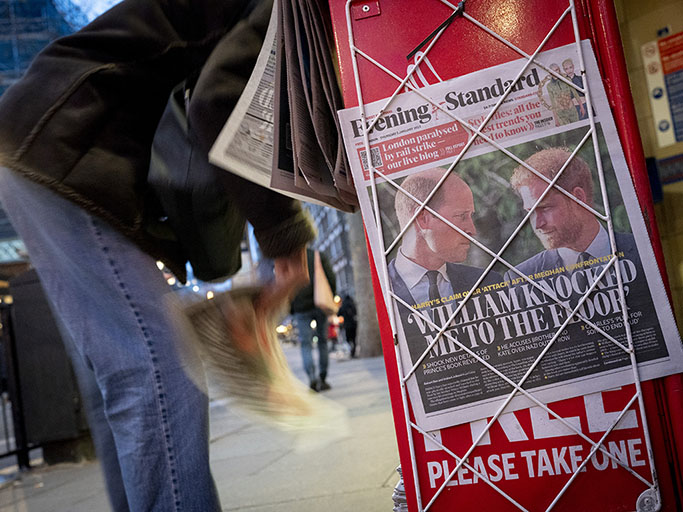
Radio 4’s Today programme this morning led with the latest on the row over Prince Harry’s book, Spare, focusing on the revelations leaked earlier this week about a physical confrontation with his brother, William.
Subsequent items covered the latest on the strikes and the government’s plans to introduce legislation to crack down on industrial action, updates on the war in Ukraine, and a UN warning about the Taliban’s ban on women working in humanitarian operations. That lineup was more or less replicated in various BBC News bulletins – always beginning with Prince Harry.
It’s patently impossible to justify that list of priorities, but the BBC is far from alone – Sky News had the same idea this morning. And every national front page except the Financial Times featured Harry’s autobiography today, with barely a handful of column inches between them on actual news.
It is of course hypocritical of me to criticise other media outlets’ obsession with Prince Harry’s decision to spill the secrets of the royal family. The New Statesman has been covering the fallout in various ways just like our counterparts. Not only that, but I’m on standby to review Spare as soon as I can get my hands on a copy next week (alas, we failed to grab one of the editions that accidentally went on sale in Spain yesterday – though that was just as well since I don’t speak Spanish). Last month I reviewed the final three episodes of the Harry & Meghan documentary on Netflix. I’m as captivated by the saga as everyone else, even though (again, probably like everyone else) I wish I wasn’t.
[See also: Prince Harry’s Spare is a deeply uncomfortable read]
Because there are far, far more important stories to be focusing on at the moment. The list of crises facing the UK is too long to go through. Our health service is falling to pieces before our eyes and the government is in denial. The cost of living has risen so sharply even people who were managing fine until recently are now struggling, while the situation for the most vulnerable has gone from dire to devastating. Our public services are crumbling under the pressure after decade of cuts and underfunding, with the situation so desperate many workers see industrial action as the only option. The tax burden is at a record high, the housing crisis is worsening, the economy is stagnating and neither of the leaders of the main political parties seem to have much in the way of vision and optimism. That’s before we look beyond Britain’s borders to the chaos, cruelty and illegal wars happening elsewhere in the world.
If reading the news at the moment fills you with exhaustion and despair, know that writing it is just as depressing. That’s not an excuse – and nor is it an admission that journalists are shirking their responsibilities. The catastrophic NHS situation has been the lead item in every one of our New Statesman editorial meetings for a month now, along with the cost of living crisis and the strikes. These issues have been leading the agenda on news bulletins and news websites since autumn, if not before. It is simply not true that, as is often claimed, the mainstream media is ignoring them.
This week there has been a new story. It’s not really “news” in the normal sense of the word; by this point no one is surprised to hear Harry rail against the media and the monarchy, and even the most shocking of the “bombshells” – the teenage cocaine use, the plea for Charles not to marry Camilla, the fight he claims to have had with his brother over Meghan – happened years ago. They have no real impact on people’s lives today – not like the days-long waits at A&E do, or the fact that heating your home costs more than double what it did last winter.
Still, it’s something different to talk about that makes a change from gloomy economic forecasts and reports of societal collapse. And journalists are seizing on it. Aside from a few constitutional fanatics insisting that this heralds the end of the monarchy, most us know Harry’s book doesn’t warrant the prominence we’re giving it. We also know that, today, it’s what people want to hear about – and, perhaps as importantly, it’s a respite for us too. Our country will still be crumbling in a few weeks’ time when the book has been published and everyone is sick of talking about it. For now, fixating over the biggest royal scandal in a quarter of a century is a kind of escapism.
It may not be healthy. It may not be rational. But right now, I’d rather read about a damaged posh boy losing his virginity to an older woman in a field (even if he can’t spell “arse” properly) than yet another brutal report on how long a pensioner having a heart attack waited for an ambulance. Wouldn’t you?
[See also: We’ve given Prince Harry no choice but to sell his story again and again]





